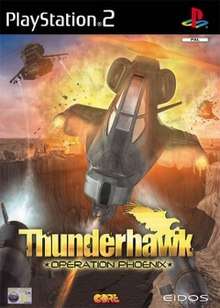Thunderhawk: Operation Phoenix
Thunderhawk: Operation Phoenix, known as Thunderstrike: Operation Phoenix in North America, is a 2001 combat flight simulator video game developed by Core Design and released by Eidos Interactive exclusively for the PlayStation 2. It is the sequel to Firestorm: Thunderhawk 2.
| Thunderhawk: Operation Phoenix | |
|---|---|
 | |
| Developer(s) | Core Design |
| Publisher(s) | Eidos Interactive |
| Platform(s) | PlayStation 2 |
| Release | |
| Genre(s) | Combat flight simulator |
| Mode(s) | Single-player |
Reception
Thunderhawk: Operation Phoenix received mixed reviews from critics. It has an aggregate score of 71.29% on GameRankings[1] and 65/100 on Metacritic.[2]
gollark: Look, if they don't want people using it, they shouldn't ship it in public client code.
gollark: Replying is *not an option*.
gollark: You *will* reply.
gollark: There is no escape.
gollark: Go https://osmarks.tk/radio/ yourself.
References
- "Thunderhawk: Operation Phoenix for PlayStation 2". GameRankings. Retrieved 4 July 2013.
- "Thunderhawk: Operation Phoenix for PlayStation 2 Reviews". Metacritic. Retrieved 4 July 2013.
This article is issued from Wikipedia. The text is licensed under Creative Commons - Attribution - Sharealike. Additional terms may apply for the media files.